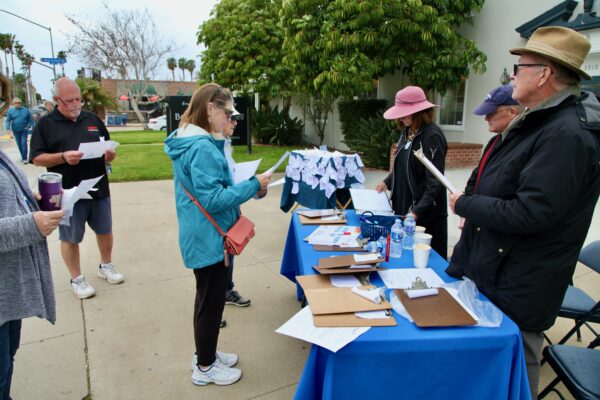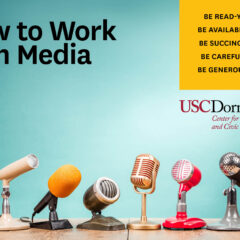This commentary was originally published in the San Diego Union Tribune by a participant in the USC Center for Religion and Civic Culture’s Compelling Preaching program.
By Anastasia G. McAteer
Regardless of your political leanings, it’s undeniable that the United States is experiencing a period of deep division. Dueling demonstrations, wars, immigration, inflation — any number of issues grab our attention daily. It might feel impossible right now to escape national politics.
But I’m here to tell you to try. It might be the very best thing you can do for your country.
I’ve lived in Ocean Beach for over a decade, during which time local involvement has become my greatest passion. It began with inviting neighbors over for dinner, and sitting on the front lawn talking to dog walkers. The more people I met, the more my awareness of my town’s needs and assets grew.
My neighbors and I don’t necessarily believe the same things, or vote the same way, but we find common ground in our actual common ground — that is, the very soil we’ve built our homes on. We start with what we share: love for our neighborhood. If our priority is working together to make a great place to live, then we can do many things despite differences.
Over time, the trust we built led to cooperation on big-impact ideas: a holiday gift drive that made a merry season for dozens of families and unhoused neighbors. A musical collaboration giving students the opportunity to publicly perform, while bringing much-needed business to a quiet block of Newport Avenue. Rescuing a historic church from potential demolition to remain a community center, where each week hundreds of people are fed, educated and find recovery.
Our micro-scale community web has resulted in strong relationships, new businesses, cleaner streets, a sense of safety and the ability to rally for greater causes than any of us could do alone.
Sociologist Robert Putnam, author of “Bowling Alone” and “The Upswing,” argues that the solution to our floundering democratic state is the incredibly simple idea that people need to do more joining in real life. In the Gilded Age, a century ago, the U.S. was mired in political division and inertia, with absurdly high levels of income inequality and widespread distrust of institutions, especially government. What changed? People joined associations, youth rallied to activism and the progressive era was born.
Over the next hundred years, groups — many starting at the local level — catalyzed radical change for the better in our country, leading to voter enfranchisement, civil rights, greater equality for the marginalized, and vast civic improvements across towns, cities and governments.
This would not have been possible without neighbors collaborating in organizations — not just showing up once, not just offering an opinion, but putting in the time and effort of building long-term relationships, through shared commitment to a club, a cause, or a community.
Some will protest that people only engage online these days. If so, why not use that tendency to support, rather than supplant, on-the-ground interaction? For instance, OB has very active Facebook groups with thousands of members, where we praise what’s going right, brainstorm how to address problems and share ways to work together (of course, we gossip and whine, too!). Focusing your online engagement in local groups means interacting with real-life neighbors, in empowering and nurturing ways, rather than haunting national sites full of strangers.
It may seem that political activism has to be done in big, broad strokes — marches, letter-writing campaigns, editorials, boycotts. But I believe it is smaller, consistent meetings that will glue our communities back together. Things as simple as the PTA, service clubs, neighborhood dinners or the classic bowling league.
I have found in my own experience that connecting with neighbors in organized ways that lead to difference-making is key to having a happy, healthy life — and creates ripples of goodwill going well beyond myself.
Spending more of your energy and time on local involvement, making a meaningful impact in your actual sphere of influence, will free you of the crushing weight of the whole world’s problems. It reminds us that what each of us can do matters, and promotes trust and confidence in our neighbors. It is difficult to dismiss someone with whom you’re in a relationship, which leads to greater open-mindedness, curiosity and tolerance. And isn’t that exactly what our divided country needs right now?
Anastasia G. McAteer is a resident of Ocean Beach doing community-building work for the local church Resurrection OB and the national nonprofit Parish Collective.




